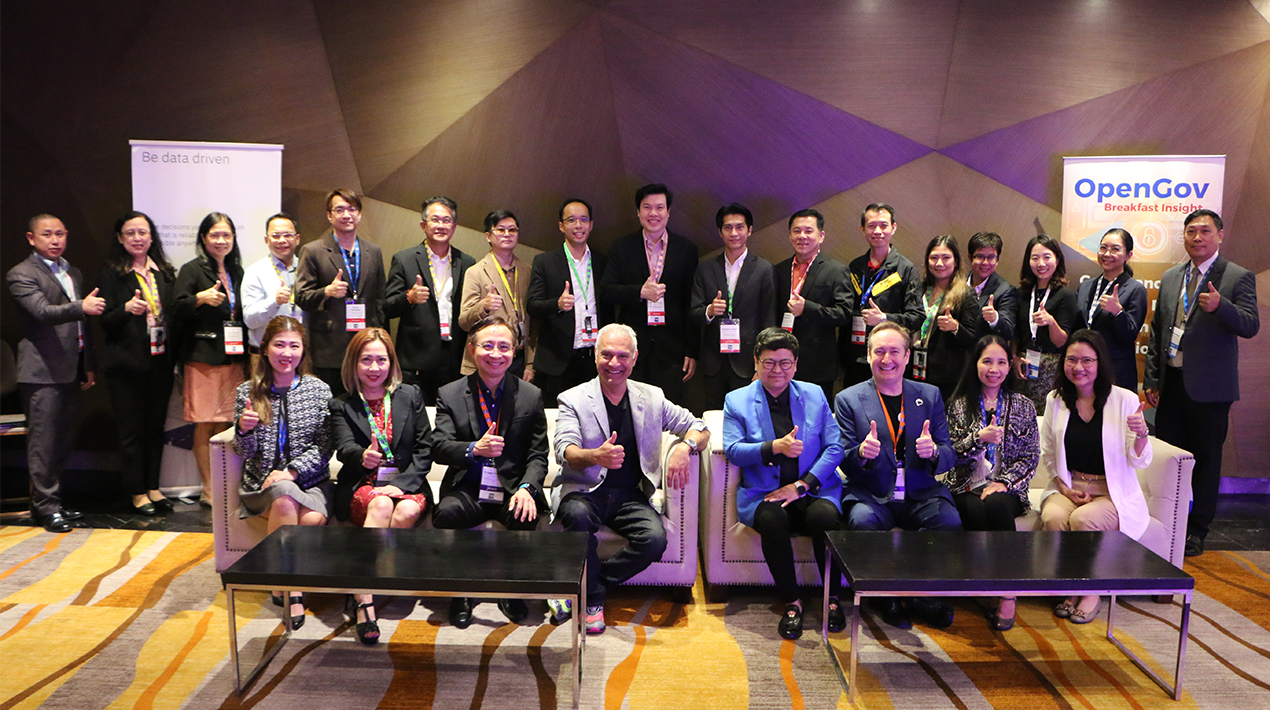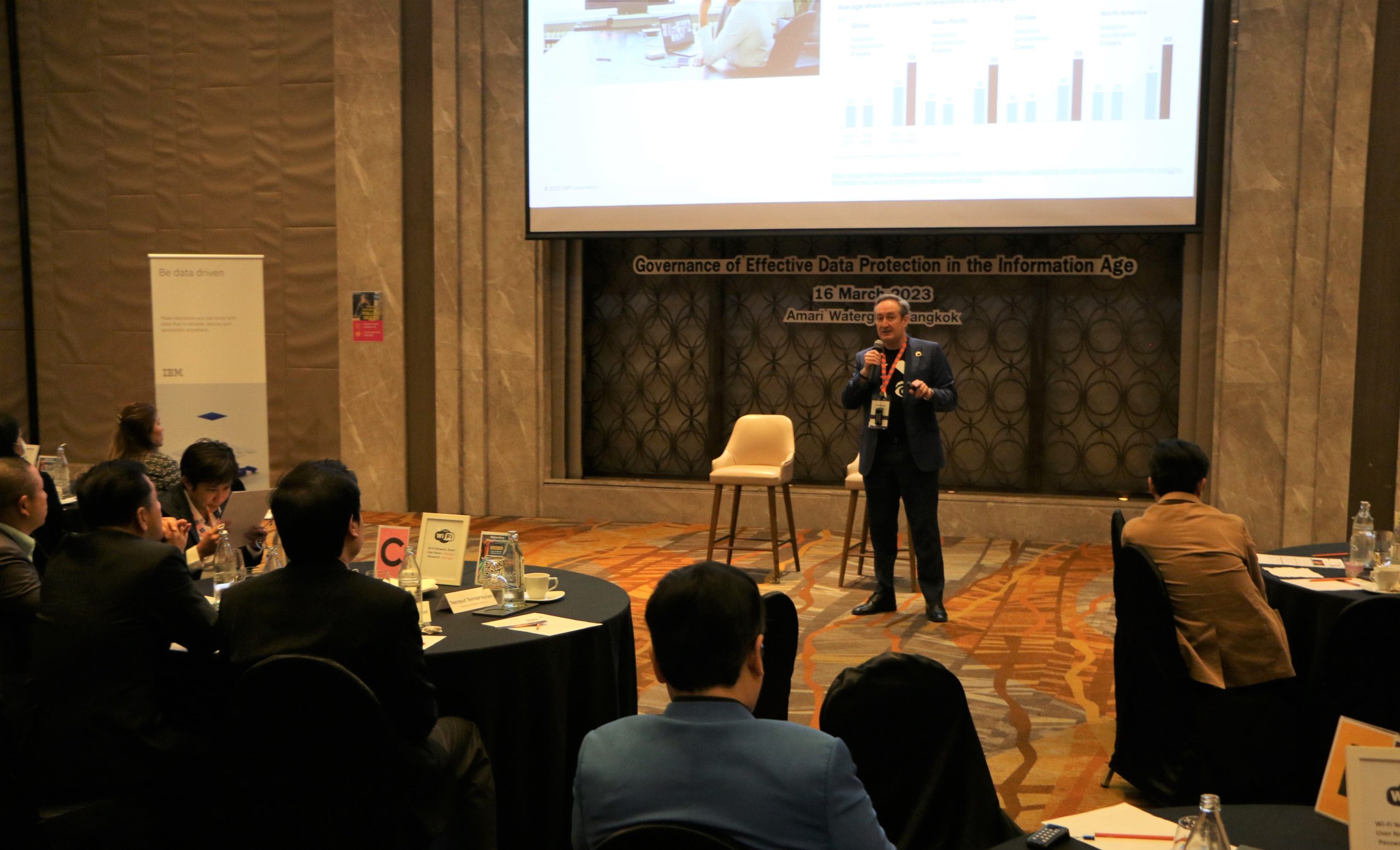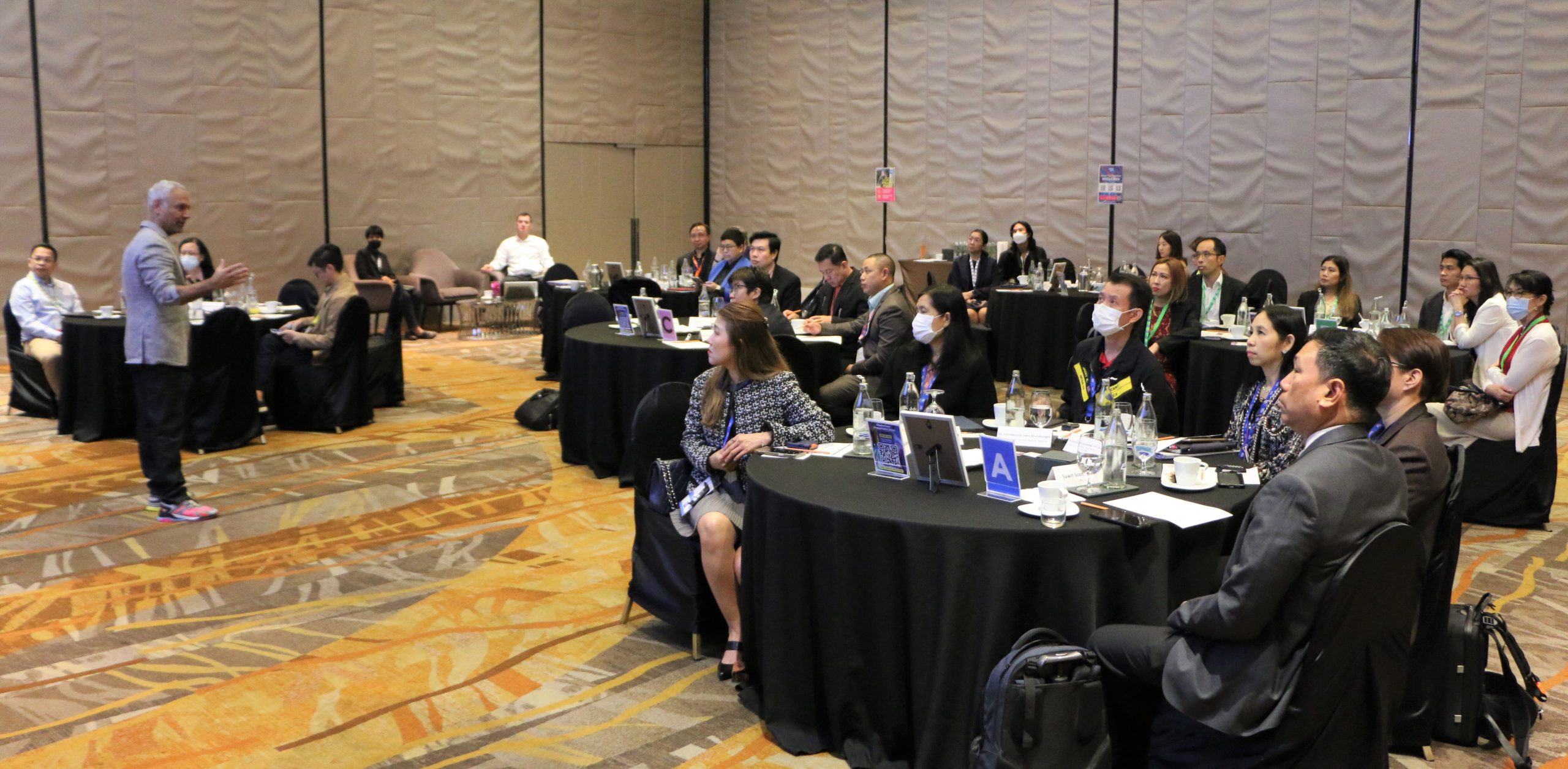
Thailand has made significant progress in enhancing its governance systems for data protection in recent years. However, to guarantee that citizens are empowered to exercise their rights and simultaneously hold corporations accountable for their data practices, it is essential to increase public knowledge and education on data protection.
Process optimisation for data governance and management is a key component of Thailand’s digital transformation. In recent years, the nation has made enormous strides in the digital sphere, and the continued success of this transformation will rely on efficient data governance and management systems.
Effective data management is only one aspect of data governance. It also relies heavily on the development of terms and guidelines for data rights, obligations and principles. These are the basic tenets of sound governance that inspire confidence in the generation, collection, processing and use of data by corporations and governments.
To unlock the full potential of data, it is crucial to establish the necessary infrastructure, regulations and standards through collaboration between public sector organisations, non-governmental actors and other relevant stakeholders.
Institutions and stakeholders within the data governance ecosystem must possess the skills, resources and incentives to carry out their duties effectively and to maximise the value of their data.
Robust information and data governance is crucial to ensure that data is accurate, reliable, secure and accessible when needed. This is especially important in low- and middle-income countries where data literacy levels may be low, and the quality of data may be poor.
In any context, however, public trust is crucial in using any derived insights to spur civic change. Confidence can be gained by developing and implementing clear policies and regulations around data collection, storage, sharing and usage. Agencies must also respect privacy, provide transparency and ensure accountability around these processes.
The OpenGov Breakfast Insight on 16 March 2023 held at Amari Watergate Bangkok delivered current information on the right technologies, data governance policies, regulations and frameworks to drive the quality, accuracy and availability of insights for Thailand’s public sector organisations.
Opening Remarks

Kicking off the session, Mohit Sagar, CEO & Editor-in-Chief, OpenGov Asia acknowledges that with the proper data governance, an organisation can rest assured that its data is being managed effectively and used in accordance with all regulations and standards.
“The effective management of data ensures its consistency and reliability and prevents misuse. This is becoming increasingly crucial for businesses, as they are subject to new data privacy regulations and rely heavily on data analytics to enhance efficiency and make informed strategic decisions,” he believes.
Good data governance enables improved access to information and better decision-making by both government officials and the public. This is achieved through the transparent, responsible and secure management of data.
“If government agencies are going to work together effectively, they need data governance policies that will make sure their information is shared in a way that is secure, appropriate and legal,” Mohit asserts.
Data governance is the systematic process of managing the availability, usability, integrity and security of data in enterprise systems, based on internal data standards and usage policies in line with government regulations. The process ensures that data is reliable, consistent and not abused.
“As organisations content with new data privacy regulations and rely on data analytics to optimise operations and drive business decisions, robust data strategy with sound governance is crucial,” Mohit says. “Using a collaborative process, this assists in dismantling data silos and harmonising data from various systems.”
Effective oversight is vital to ensuring the proper use of data and preventing the potential misuse of sensitive information, like customer data. Effective data governance enhances business decision-making by supplying better information, resulting in competitive advantages, increased revenue, and increased profits.
Self-service data solutions reduce reliance on IT staff and promote quicker and more informed decision-making across the entire organisation by allowing non-technical users to freely access, modify and analyse data.
To implement data governance, organisations must establish rules, processes and standards for managing data. This includes defining roles and responsibilities, ensuring data quality and addressing privacy and security concerns.
Data governance and cybersecurity are closely related as cybersecurity plays a crucial role in protecting sensitive information from unauthorised access. It helps to maintain data privacy and confidentiality while reducing the risk of cyberattacks or data breaches that could potentially compromise the functioning of government systems and erode the trust of citizens. Therefore, cybersecurity is an essential component of data governance.
In the end, implementing data governance can have several benefits, including improving the speed, agility and precision of decision-making while maintaining privacy and security. Moreover, it can also assist organisations in maximising the value of their data assets.
Welcome Address

Pawasut Seewirot, Software Country Leader at IBM Thailand, delivered a welcome address to the attendees where she acknowledged their crucial role in promoting an understanding of data governance concepts, such as privacy and security.
The field of intelligent automation mainly comprises advanced technologies, including artificial intelligence, business process management, and robotic process automation. It leverages cutting-edge tools such as analytics, machine learning, deep learning, and natural language processing to accomplish its objectives.
“Combining these technologies has enabled intelligent automation to produce some of the most cutting-edge solutions utilised by contemporary business leaders,” Pawasut observes.
Digital transformation, however, can often come at a high cost. The proliferation of vendors can create a bottleneck for IT staff, with disparate vendors, tools, and processes required to obtain support for expanding data centres.
IBM Technology helps businesses and CIOs solve these issues. As organisations rapidly undergo digital transformation and change, utilising global technology lifecycle support and services for IBM Systems products will benefit the organisations.
“Our organisation provides global technology lifecycle support and services. As a world-class provider, we are committed to providing an outstanding client experience, as evidenced by our Net Promoter Scores,” Pawasut claims.
As organisations continue to rely more heavily on digital technology to gain a competitive edge, safety becomes a growing concern. A strong cybersecurity strategy includes multiple layers of defence to combat cybercrime, such as cyber-attacks that attempt to access, change, or destroy data, extort money from users or the organisation, or disrupt normal business operations.
Security system complexity can increase costs due to contrasting technologies and a lack of in-house expertise. However, organisations can effectively combat cyber threats and reduce the lifecycle and impact of breaches by implementing a comprehensive cybersecurity strategy that adheres to best practices and is automated using advanced analytics, artificial intelligence, and machine learning.
Pawasut stresses the importance of a data platform which is a set of technologies that function collectively to meet an organisation’s end-to-end data needs. It allows organisations to acquire, store, prepare, deliver and govern their data, as well as provide a security layer for users and applications.
“A data platform is essential for maximising the value of your data,” says Pawasut. “A modern data platform attempts to solve numerous problems. It is a collection of interoperable, scalable, and replaceable technologies that work together to meet the complete data requirements of an enterprise while ensuring its security.”
Technology Insight

While the world has been disrupted by various events, Kieran Hagan, Data, AI, and Automation Principle Technical Sales Manager (ASEANZK), IBM recognises that digital transformation remains a significant driving force for change.
“The pandemic has hastened the adoption of digital solutions to keep up with the ever-changing requirements of their customers,” Kieran observes.
As technology advances and consumers rely more heavily on digital channels, the trend toward digital transformation is expected to continue, creating a greater need for easily accessible and understandable data. As a result, there is a greater demand for consumable data – information that is easily accessible and understandable – from which people can make informed decisions.
To improve service delivery, Kieran emphasises the importance of engaging citizens and providing them with personalised, integrated experiences across government services. This is essential for any government seeking to improve citizens’ trust, satisfaction, and overall experience by making it easier for them to access and benefit from the services they require.
Sonoma County is an excellent example of a government that prioritised strengthening its safety net and reformed its approach to meeting the needs of its most vulnerable individuals and families.
Kieran emphasised the need to digitally modernise workflows and operations, maintain regulatory compliance and foster innovation while reducing costs. DataOps is emerging as the optimal strategy for managing data to enhance the agility and effectiveness of organisations.
DataOps, like its predecessor DevOps, emphasises software development collaboration, automation, and continuous delivery. It also aims to eliminate the silos between teams involved in data management, such as data engineers, data scientists, and business analysts.
According to Kieran, the advent of DataOps represents a significant shift in the way that organisations manage and leverage data and by adopting a more agile and collaborative approach to data management, organisations can make better use of their data, respond more quickly to changing business needs, and gain a competitive advantage in their respective markets.
 The emphasis on data quality is a key feature of DataOps. DataOps is concerned with ensuring data accuracy, completeness, and consistency, all of which are critical for making sound business decisions. Data quality issues are identified using automated testing and validation technologies before they have an impact on company operations.
The emphasis on data quality is a key feature of DataOps. DataOps is concerned with ensuring data accuracy, completeness, and consistency, all of which are critical for making sound business decisions. Data quality issues are identified using automated testing and validation technologies before they have an impact on company operations.
Kieran cited the efforts of the Government of Odisha (India), which worked to combat welfare fraud and ensure that the most vulnerable members of the population received the necessary assistance.
The government of Odisha (India) used IBM Analytics tools to combat welfare fraud, identifying approximately 500,000 false beneficiaries. The government was able to ensure that resources were delivered equitably and tax rupees were used more efficiently by leveraging available insights on citizens. This effort aided the government in providing appropriate assistance to those in need while also eradicating fraudulent activities that siphoned off valuable resources.
Securing and protecting people, the nation, and infrastructure while mitigating data collaboration risks across hybrid cloud environments is of the utmost importance in the current digital era. The proliferation of cloud computing and hybrid cloud environments, as well as the accompanying cyber security challenges, now necessitate that governments strike a balance between securing their data and infrastructure and ensuring that essential information is accessible to those who require it.
To mitigate risks associated with data collaboration in hybrid cloud environments, businesses should implement a comprehensive security strategy that combines technologies, processes, and policies. Hence, artificial intelligence (AI) is a valuable tool.
“Artificial intelligence is being incorporated into daily life, business, government, and other fields. IBM assists individuals and businesses in securely adopting AI,” Kieran shares. “Only by incorporating ethical standards into AI applications and processes can build a trustworthy system.”
A holistic approach with strong security measures, transparency, accountability, and secure technology design is highly recommended, according to Kieran. Thus, the effectiveness of the strategy is enhanced by a continuous drive for information and education.
Fireside Chat

Dr Supot Tiarawut, President & CEO, Digital Government Development Agency, Thailand, is of the opinion that organisations’ failure to implement effective data management and governance strategies hinders their ability to fully leverage their enterprise data.
Such strategies are necessary for laying a strong data foundation. Strong fundamental data can offer critical insights for a wide range of applications, including understanding public behaviour and making critical decisions.
Some countries have given particular attention to the strategic value of understanding and interpreting data as well as the unrealised economic potential of underutilised data.
“Establishing a data foundation has specific challenges, but if organisations fully understand these challenges, they will be able to overcome them and benefit from efficient master data management,” Dr Supot believes.
Data governance is the practice of understanding where the data is, how it is used, and whether it is adequately protected. Good data governance ensures the integrity and consistency of data.
Effective data governance creates a governed data foundation for insights, secures data privacy, and simplifies data management by establishing policies and regulatory compliance. Public sector staff must have the knowledge and skills to effectively and safely manage and use data.
“The lack of data literacy in government agencies emphasises the importance of effective data governance policies,” Dr Supot furthers.
 In today’s dynamic and ever-changing enterprise environment, data governance is a must. Businesses today collect massive amounts of data from various sources, and data governance assists organisations in managing risk, maximising value and lowering costs.
In today’s dynamic and ever-changing enterprise environment, data governance is a must. Businesses today collect massive amounts of data from various sources, and data governance assists organisations in managing risk, maximising value and lowering costs.
Inconsistencies in various systems across an organisation may remain unresolved in the absence of effective data governance. Using data governance best practices allows organisations to maximise their data while avoiding operational or analytic issues caused by data disparity.
“We should have a good definition of what data governance is,” says Dr Supot. “It encourages all government agencies to utilise their data and use it efficiently as well as integrate their data to make good decisions.”
In Thailand, there is a growing understanding that instead of solely mandating government agencies to implement data policies strictly according to established guidelines, it may be more effective to first align these policies with the agencies’ goals or purposes, and then provide them with specific steps that can help them get started.
The government in Thailand is planning to ask each agency to identify the type of data they are utilising, and once they have this information, they will inquire about the data’s processing and how it will be protected. This approach will enable the government to better understand the data management practices of each agency and identify any potential issues that need to be addressed.
“As a result, we can ensure sufficient data security so that no information leaks occur,” Dr Supot is confident.
Standardising data definitions across an enterprise or agency is a common objective of data governance, but there may be other objectives and goals that depend on the specific focus of a data governance program.
To establish an effective data governance framework, it is important to develop principles that are appropriate for the specific environment in which the organisation operates. These principles should guide the overall approach to data governance and help ensure that data is managed in a way that is consistent, reliable, and aligned with the goals and objectives.
Collaboration between the government and the private sector is essential for effective data governance. Among the key principles of data governance are public integrity, transparency, accountability, auditability, and standardisation. By adhering to these principles, data is managed in a way that is consistent, trustworthy and compliant with relevant regulations and standards.
Closing Remarks
Pawasut stressed the growing need for skilled professionals in data management as businesses increasingly look to data for competitive advantage. She believes that by addressing the data management skills gap, organisations can help individuals advance in their careers and organisations realise the full potential of their data.
 “We are taking all possible measures to address the shortage of skilled workers,” confirms Pawasut. “But closing the gap will require collaborative efforts among individuals, groups and communities.”
“We are taking all possible measures to address the shortage of skilled workers,” confirms Pawasut. “But closing the gap will require collaborative efforts among individuals, groups and communities.”
Changing an organisation’s innovation culture is a challenging and time-consuming endeavour that requires sustained efforts over time. Pawasut invited interested delegates to get in touch with them to arrange an innovation workshop.
These workshops are valuable because they help foster originality, teamwork, knowledge acquisition and participant involvement. They provide a platform to generate new ideas, solve complex problems and learn from the experiences, insights and perspectives of others.
Innovation workshops can also boost morale and commitment to the company’s success and can be a useful tool for organisations that want to foster innovation and maintain competitiveness in a dynamic market.
Mohit is convinced that the success of developments in data governance depends on the effectiveness of collaboration.
“Integral to ensuring that an organisation’s information management procedures and policies are effective, streamlined, and company-wide adopted is bringing together diverse stakeholders, each with their own distinct perspectives and skills.”
There is an opportunity for corporate IT departments to build trust around enterprise data stores, allowing employees to work with IT to improve data quality, governance and security. This transition may be challenging for some organisations as it may require changes in culture, processes and technology, but it is essential for organisations that want to maximise the value of their data assets.
“Ultimately, a digital partnership’s objective is to generate a competitive advantage. Businesses can leverage one another’s strengths to better serve customers and expand,” Mohit concludes.
















